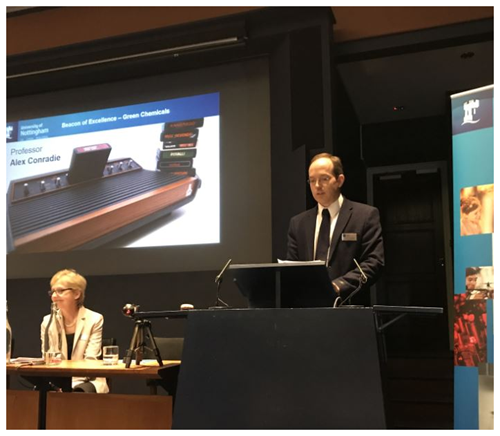Notts Uni to reprogramme chemicals production

GREEN chemicals are a focus of a new £200m (US$253m) investment announced by the UK’s University of Nottingham today, as it pledged to tackle global challenges through six new multi-disciplinary research groups.
Speaking at the launch of the Beacons of Excellence programme in London today, chemical engineer Alex Conradie, who will lead Nottingham’s Green Chemicals Beacon said he wants new methods of production to imitate the Atari games console of the 1980s. In this vision for “reprogramming chemicals production”, multidisciplinary teams of chemical engineers and synthetic biologists will use techniques including genetic engineering to create cellular factories that can be swapped in and out of a facility like a games cartridge, producing a range of chemicals from the same raw materials.
“The green chemicals beacon will integrate the University of Nottingham’s leading expertise in genetic engineering, process engineering and sustainable chemistry, all the way from conceptualisation through to technology demonstration.
“As such the Green Chemicals Beacon will propel the product and process development cycles forward faster, smarter and with more innovation creating a technology platform that will unleash the economic potential for our collaborators.”
The platform developed by the beacon will look at how to produce a wide range of products including bulk, platform and fine chemicals.
In an interview with The Chemical Engineer, Conradie said the platform would use novel techniques including CRISPR that allows rapid genetic engineering to hone organisms capable of producing chemicals more economically and sustainably. Chemical engineers will be front and centre of the scheme, he noted, describing them as vital to technology transfer, scale-up, and for boosting yields and product recovery.
“The money will go towards creating this technology platform […] in the fastest, rapidly spinning development cycle you can imagine to produce new products – not only existing chemicals but also new chemicals that would advance the lives of our communities today.”
The Green Chemicals Beacon has already begun engaging with industrial partners, who were invited to the launch.
“They have all expressed great interest in what our technology platform can offer,” he said. He added that industry partners will help keep the research directed towards creating processes for both new and existing products that may be inefficient and expensive to produce through conventional methods.
The Green Chemicals Beacon is one of six that the University committed to funding, with each contributing towards the UN’s Sustainable Development Goals. Others that will share the £200m investment will help develop new ways to feed the world, develop smart industrial systems, and end slavery.
Recent Editions
Catch up on the latest news, views and jobs from The Chemical Engineer. Below are the four latest issues. View a wider selection of the archive from within the Magazine section of this site.




